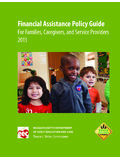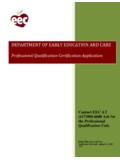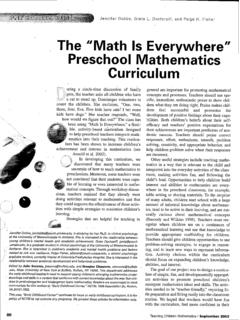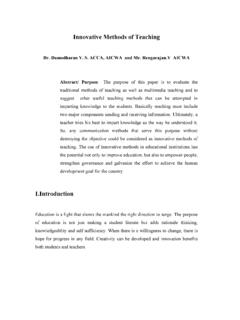Transcription of Guidelines for Preschool Learning Experiences
1 Early Childhood Advisory Council to the Massachusetts Board of EducationPreschool Learning ExperiencesGuidelines forMassachusetts Department of EducationThis document was prepared by the Massachusetts Department of EducationDr. David P. Driscoll, Commissioner of EducationApproved April 2003 Board of Education MembersJames A. Peyser, Chairman, Dorchester Henry M. Thomas, III, Vice-Chairman, SpringfieldCharles D. Baker, Swampscott J. Richard Crowley, AndoverJudith I. Gill, Chancellor, Higher Education, BostonWilliam K. Irwin, Jr., WilmingtonMr. Jeff DeFlavio, Chair, Student Advisory Council, BelmontRoberta R. Schaefer, WorcesterAbigail M. Thernstrom, LexingtonDavid P. Driscoll, Commissioner and Secretary to the BoardPhotographs: Thanks to Belvia Wilkerson and the families of Nigel, Jonathan, Raven, Raleen, and Andrew in the Kids First Early Learning Program in : Thanks to Sullivan Creative in Watertown, The Massachusetts Department of Education, an Affirmative Action employer, is committed to ensuring thatall of its programs and facilities are accessible to all members of the public.
2 We do not discriminate on thebasis of age, color, disability, national origin, race, religion, sex, or sexual orientation. Copyright 2003 Massachusetts Department of EducationPermission is hereby granted to copy any or all parts of this document for non-commercial educational purposes. Please credit the Massachusetts Department of document is printed on recycled of School Readiness, 350 Main Street, Malden, Massachusetts 02148-5023 #781-338-30001 Guidelines for Preschool Learning ExperiencesAcknowledgmentsIntroductionGu iding Learning in English Language ArtsGuiding Learning in MathematicsGuiding Learning in Science and Technology/EngineeringGuiding Learning in History and Social ScienceGuiding Learning in Health EducationGuiding Learning in the ArtsAppendix AA: Adaptions for children with DisabilitiesResourcesList of ContributorsTable of Contents23713192731394547532 The Department of Education extends its sinceregratitude to the members of the MassachusettsBoard of Education s Early Childhood AdvisoryCouncil and to those who served on the StandardsSubcommittee and Curriculum Workgroup for theirwisdom, guidance, and hard work in developingthese standards and Guidelines .
3 A complete list ofparticipants may be found at the end of this docu-ment. Thanks also to the staff of Early LearningServices, in particular Elisabeth Schaefer for herguidance and vision of this project, the primarywriter Sandra Putnam Franklin, and to AnnetteLamana and Lisa Van Thiel who assisted in writingthe Arts section of the Guidelines . In addition, we want to acknowledge the workon early childhood Learning standards by other State Departments of Education, in particular,Louisiana, Pennsylvania and Connecticut. We also thank the following Massachusetts school districts who shared their early childhood curricu-lum materials and gave permission to utilize them in developing statewide Guidelines : Brockton PublicSchools, Cambridge Public Schools, GreenfieldPublic Schools, Holyoke Public Schools, MohawkTrail Regional School District, Northbridge PublicSchools, Plymouth Public Schools, Walpole PublicSchools, Worcester Public Early Childhood Program Standardsand the Guidelines for Preschool Learning Experiencesreflect the MassachusettsDepartment of Education s commitment to quality, in order to ensure a solid foundation for Learning and school success.
4 The role of theearly years in a child s development has received a great deal ofattention in recent years. Research on brain development supportsthe value of high quality early childhood education programs foryoung children , while studies of early childhood education also provide evidence for their benefits. The national Cost, Quality, andOutcomes study (Helburn, 1995) showed that children who have tradi-tionally been at risk of not doing well in school are affected more by the quality of early childhood Experiences than other children Carolina Abecedarian study found that early childhood educationsignificantly improved the academic achievement of poor childreneven into early adulthood, showing higher reading and mathematicsscores for individuals who had received early Guidelines for Preschool Learning Experiencesis based on the standards for PreK-K (or PreK-Grades 1-4) in the approvedrevisions of the Massachusetts Curriculum Frameworks.
5 The LearningGuidelines are based chiefly on these standards, and are followed by ideas for Learning Experiences that Preschool staff can use todesign a multitude of foundational Learning Experiences for youngchildren. The number of the related standard in the relevantFramework appears in a note after each Learning Guideline. Links to the Frameworks are primarily needed for aligning curriculum withinpublic schools and for others involved in the continuity of curriculumfrom Preschool (public and non-public) into kindergarten. If needed,relevant sections of the Frameworks may be checked on the For the sake of eliminating repeti-tion, some areas have been combined when a topic appears in morethan one Framework. Guidelines focus on what staff should do to helpyoung children develop needed skills and knowledge rather than on what children are expected to know and do at the age of three or four.
6 Although the Learning Guidelines reflect individual contentareas, they should be used in an integrated way for curriculum plan-ning and pedagogy. The Guidelines for Preschool Learning Experiencesis designedto be used by teachers and program administrators in planning andevaluating curriculum. Programs need to demonstrate that they areutilizing the Guidelines to plan curriculum by maintaining written doc-umentation of goals and curriculum plans. This should not present anyadditional burden to programs already operating under CommunityPartnerships for children because they are already doing this underthe Office for Child Care Services (OCCS) Standards and/or theNational Association for the Education of Young children (NAEYC)accreditation criteria, both of which require curriculum planning. TheGuidelines are voluntary to the extent that programs are not expectedto meet all of the Guidelines but only to demonstrate that they areproviding Experiences that build broad and balanced foundations forlearning in all content areas.
7 While the terminology in the Guidelinesmay sound sophisticated for Preschool children , teachers should beable to articulate to parents and to the community how early experi-ences relate to later academic achievement. The following principles should serve as a guide in understanding and implementing the Guidelines for PreschoolLearning Experiences :1. All young children are capable of children arecapable of positive developmental outcomes. Preschool teachersshould hold high expectations for all young children show individual differences in develop skills and competencies through a generallypredictable sequence of milestones, they do not develop them inexactly the same way or at exactly the same time. Some childrenmay have a developmental delay or disability that requires individu-alized expectations, Experiences , and Knowledge of child growth and development is essential for pro-gram development and about appropri-ate curriculum for groups of children and for individual childrenshould be based on knowledge of child development and on carefulobservation of children at children s language skills are the best predictors of of children s English language skills shouldbe a major goal of the Preschool curriculum.
8 Early childhood is acritical time in the development of vocabulary and other languageskills. These skills provide the foundation for Learning to read andwrite and for later academic Developmental domains are highly in one domain influences the development in other domains. Thisinterrelationship must be considered in planning Preschool pro-grams. For example, children s mathematical Learning may occur onthe playground, in dramatic play, and while using sensory materials. 6. Young children learn by should provide opportunitiesfor children to explore materials, to engage in physical activities,and to interact with peers and adults. A balance of child-initiatedand teacher-selected activities will maximize children s Families are the primary caregivers and educators of their staff must give families the information they mayneed to support their children s Learning and development.
9 Programstaff and families should also work together to ensure that childrenare provided with the best Learning Experiences possible at homeand at Preschool . IntroductionGuidelines for Preschool Learning Experiencesstructures Learning through play and meaningful activities in a developmentalsequence. The mark of a superior teacher is the ability to select mate-rials and interact with children in ways that help them learn throughtheir own play and these planned activities. Young children needmany and varied opportunities to: Plan: children consider what they are going to do with materials and how they are going to do it. Play: children use materials and equipment in ways that best suittheir personal curiosity and understanding. Reflect: children recall things that happened to them, reinforcing or questioning their understandings.
10 Revisit: children practice skills and replay Experiences in many dif-ferent ways, with each activity refining or modifying previous Learning . Connect: children , with the help of staff, connect new knowledgewith past Experiences , creating links among subject areas andareas of skill CurriculumEarly childhood educators need to become aware of children sindividual interests and strengths and find ways to engage andexpand them. They can do so by arranging for a rich variety of Learning Experiences that appeal to all the senses visual, auditory,and physical and by alternating individual, partnered, small group,and large group activities so that children experience various kinds of social early childhood programs, assessment takes place by observingchildren in daily activities and taking note of their skills, understandings,interests, vocabulary, and attitudes toward various tasks.












